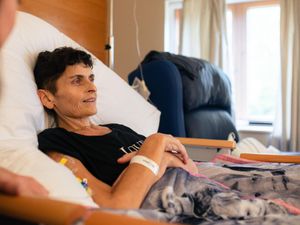Wolverhampton to be 'smokefree' in seven years - though city still puffs more than rest of region
Wolverhampton has more smokers than most of the UK but a new partnership has been launched aiming to make the city 'smokefree' by 2030.

The Government has set a target of making the country 'smokefree’ (which it defines as when less than five per cent of the population smokes) and will soon stop children who are 14 or below this year from ever legally being sold cigarettes in England, by raising the purchase age on an annual basis.
Smoking rates are thought to be higher in Wolverhampton than many parts of the country, with the Annual Population Survey estimating that 15.2 per cent of adults in Wolverhampton smoke, compared to 13.4 per cent in the West Midlands and 12.7 per cent in England.
The Wolverhampton Tobacco, Smoking and Vaping Addiction Partnership will include the City of Wolverhampton Council, the NHS Black Country Integrated Care Board, Wolverhampton's health and wellbeing board Health and Wellbeing Together and other organisations, and will bring together various activities across the city to help people quit and prevent younger residents from starting to smoke in the first place.
Councillor Jasbir Jaspal, Cabinet Member for Adults and Wellbeing and chair of Health and Wellbeing Together, said: "Smoking is one of the biggest causes of death and illness in the UK – it causes 70 per cent of all cases of lung cancer and increases the risk of coronary heart disease, heart attack, stroke and chronic obstructive pulmonary disease.
"Second-hand smoke or passive smoking can also increase the risk of a number of conditions; children and babies are particularly vulnerable to the effects of second-hand smoke and for women who smoke in pregnancy, harms caused to their babies include low birth weight, miscarriage, still births and sudden infant deaths.
"Ideally, it's best that nobody smokes or vapes. That said, if adults smoke tobacco, switching to vaping is better – it's less harmful, but it is important to understand that it is still harmful.
“That’s why we don’t want anyone who doesn’t smoke to start either smoking or vaping, particularly children."
She added: "We are really pleased to be developing the Wolverhampton Tobacco, Smoking and Vaping Addiction Partnership because we know that a coordinated approach has the ability save hundreds of lives each year, improve people's quality of life, protect babies and children from harm, and reduce the burden on the NHS. Given the financial cost associated with smoking, it will also lift households out of poverty and help reduce crime."
The partnership is due to be stood up this month and will start by developing an action plan which includes reducing access to vapes by school-aged children, supporting Trading Standards to prevent the supply and sale of illicit tobacco and use new powers to tackle sales to underage people, and using vaping as a tool to quit smoking, as recommended by the National Institute of Clinical Excellence.
Co-ordinated campaigns will be run to increase awareness of the harms of smoking and the support available to residents to quit, training will be given to frontline health and wellbeing staff so they can provide advice and support, and a new 'lifestyle service' currently under development will provide stop smoking support along with nicotine replacement therapies and e-cigarettes to residents who are trying to quit.





